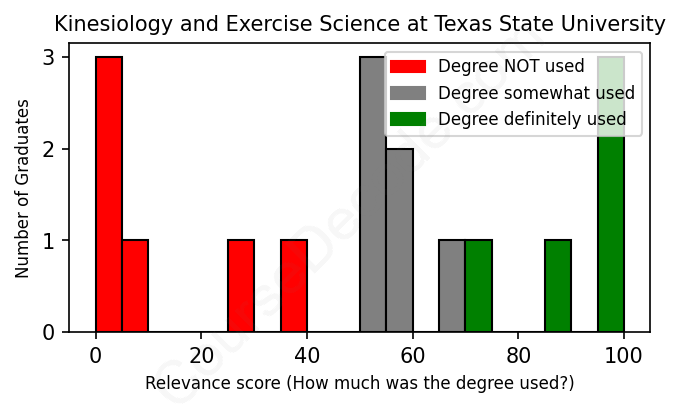
First, some facts. Of the Kinesiology and Exercise Science graduates from Texas State University we've analyzed , here's how many have used (or NOT used) their degree in their career:

These are estimates based on AI analysis of 17 LinkedIn profiles (see below).
The verdict? Significantly below average. Overall, with an average relevance score of 51%, Kinesiology and Exercise Science graduates from Texas State University have a much lower likelihood (-16%) of finding work in this field compared to the average graduate across all fields:
And for comparison, here's the chart for all profiles we've looked at across all degrees.
Also, after graduating, 41% of these graduates have pursued further education other than another Bachelor's degree (such as a Masters degree or other), compared to the average across all profiles of 35%. This suggests you may need more than just a Bachelors degree to be competitive as a Kinesiology and Exercise Science graduate.
See the details:
|
Relevance score: 0% We think this person has NOT gone into a career related to their degree. We think this person has NOT gone into a career related to their degree.
DEGREE INFOGraduated in 2021 from Texas State University with a Bachelor's degree in Kinesiology and Exercise Science. No other secondary education since. JOB HISTORY SINCE GRADUATIONData Coordinator Integris Neuro LLC Feb 2022 - May 2023 ABOUTNo information provided. |
The top 10 most common jobs done by the graduates we've analyzed (ranked most common to least) are:
Looking at the career paths of graduates from Texas State University with a degree in Kinesiology and Exercise Science, it’s clear there’s a mix of relevance to their studies. A large chunk of these individuals has landed jobs where they can flex their kinesiology muscles, especially in roles like Physical Education Teachers, Personal Trainers, and Physical Therapists, which directly leverage the skills and knowledge they gained in school. For instance, being a Physical Therapist or a Personal Trainer is pretty much a textbook example of applying what they learned about human anatomy and exercise in real-world situations.
However, it's also striking how many graduates have taken paths that don’t relate at all to Kinesiology or Exercise Science. Positions in marketing, logistics, and even sales are common among the profiles, showing that not every graduate is using their degree in a way you might expect. There are certainly opportunities to blend exercise science into various fields, but many of these jobs seem to sidestep the core principles of kinesiology altogether. So, while there are some solid connections to the degree, it looks like not every graduate found their way into a job that directly utilizes their Kinesiology and Exercise Science knowledge.
Here is a visual representation of the most common words in job titles for Kinesiology and Exercise Science graduates (this is across all Kinesiology and Exercise Science graduates we've analyzed, not just those who went to Texas State University):

Graduates from Texas State University with a degree in Kinesiology and Exercise Science have carved out a range of career paths, some aligning closely with their field of study while others veer into unrelated territories. Generally, many fresh grads tend to start with roles like teaching physical education or taking on positions in health and wellness sectors, such as personal trainers or physical therapy aides. For instance, those who graduated in 2012 and 2015 found themselves in teaching positions shortly after, which reflects a common early career choice. The first job often serves as a stepping stone into more specialized or advanced roles later on.
Fast forward five to ten years, and you start seeing a mix of outcomes. Some graduates like those who majored in Kinesiology have transitioned into specific health-related careers, such as physical therapists or occupational therapists, which are great fits for their background. Others have taken unique paths, shifting into roles like marketing director, sales, and even education leadership. However, there’s also a noticeable chunk of graduates who drifted towards roles that don’t directly pertain to exercise science, often ending up in sales or administrative positions. While this shows versatility, it might suggest a gap between their education and career applications in some cases. Overall, while many grads are indeed finding rewarding careers related to their field, others are exploring different directions that may not fully utilize their Kinesiology backgrounds.
Getting a Bachelor’s degree in Kinesiology and Exercise Science at Texas State University can be a pretty challenging but also rewarding experience. It’s generally on the moderate side in terms of difficulty compared to other majors—you'll definitely need to hit the books and put in some serious effort, especially with the science courses like anatomy and physiology. But if you’re passionate about fitness, health, and the human body, it can be really engaging and fun. Plus, there are often hands-on activities and labs that make learning more interactive. Just like any college program, you’ll have your tough spots, but if you stay organized and motivated, you’ll be able to handle it just fine!
Most commonly, in the LinkedIn profiles we've looked at, it takes people 4 years to finish a Bachelor degree in Kinesiology and Exercise Science.
Looking at the careers of these Texas State University graduates, it seems like they’re doing pretty well for themselves, especially considering the variety of jobs they’ve landed post-graduation. The folks who started out in teaching or healthcare are moving into more specialized roles, like physical therapy and health management, often with good earning potential. The marketing and management positions seem to have led to some decent paychecks, too. However, there are a few who started in retail or entry-level roles, which might not exactly scream “big bucks.” Overall, while some are likely making a solid income, others might still be grinding it out a bit for a better paycheck. So, it really depends on the specific career path they chose!
Here is a visual representation of the most common words seen in the "about" section of LinkedIn profiles who have a Bachelor degree in Kinesiology and Exercise Science (this is across all Kinesiology and Exercise Science graduates we've analyzed, not just those who went to Texas State University). This may or may not be useful:

Here are all colleges offering a Bachelor degree in Kinesiology and Exercise Science (ordered by the average relevance score of their Kinesiology and Exercise Science graduates, best to worst) where we have analyzed at least 10 of their graduates: